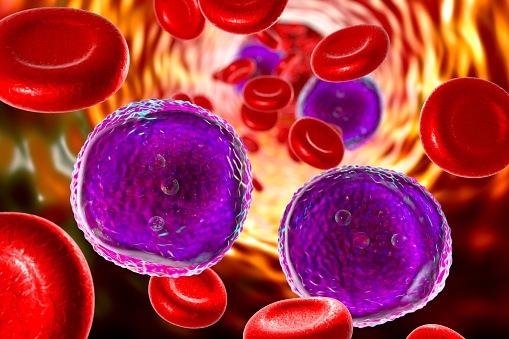New blood test could stop one in 10 cancer deaths
A blood test for the over 50-year-olds being tried by the National Health Service (NHS) may prevent as many as one in 10 cancer deaths NHS is conducting a world-first trial of the test which aims to detect more than 50 types of cancer before symptoms show. Although there are no results yet, researchers are […]

Acute lymphoblastic leukemia, 3D illustration showing abundant lymphoblasts in blood
A blood test for the over 50-year-olds being tried by the National Health Service (NHS) may prevent as many as one in 10 cancer deaths
NHS is conducting a world-first trial of the test which aims to detect more than 50 types of cancer before symptoms show.
Although there are no results yet, researchers are optimistic that it has “enormous” potential. Based on modelling, they believe the Holy Grail test could prevent about 10 per cent of cancer deaths, of which there are around 167,000 in the UK every year – nearly 460 a day. The breakthrough could save around 16,000 lives annually.
Hundreds taking part in the trial of 140,000 volunteers are already being referred for a scan or colonoscopy as a result of the test’s findings. It is expected that around half of those referred could have cancer.
If the trial proves successful, the test will be rolled out to a million more people as early as 2024, then possibly nationwide.
If the test are made available across the UK and offered to around 18 million adults aged 50 to 79, roughly 130,000 more people without symptoms will receive cancer screening referrals each year assuming one in 100 test positive as investigators expect.
British researchers believe the cancer test by US company, Grail, could be a “turning point” in how NHS tackles the disease.
NHS is grappling with a post-COVID backlog of cancer referrals, and leaked data this month show that more than 10,000 people are waiting for treatment three months after having been referred for suspected cancer. But it is hoped the situation would have changed by the time the test is potentially rolled out.
Professor Peter Sasieni, one of three lead investigators in the trial from King’s College, London, said, “The potential of this blood test to dramatically cut the number of people who die from cancer is enormous. Of course, if the test is rolled out by NHS, we will see some increase in short-term workload from the slightly higher number of referrals for cancer.
“But in the long run, there should also be many savings for NHS, such as a reduction in the need for chemotherapy and expensive drugs for advanced cancers.”
The blood test, called “Galleri test”, picks up fragments of DNA linked to cancer which are shed into the blood and can suggest which part of the body it comes from. It revolutionises the way cancer is detected, as most patients are currently diagnosed only after developing symptoms. It will become clear only after the NHS trial results are published; whether the test can prevent around 10 per cent of all cancer deaths, as the modelling suggests.
But the test provides hope for hard-to-detect cancers such as ovarian and pancreatic, which are usually picked up far too late.
The NHS trial, led by The Cancer Research UK and King’s College London Cancer Prevention Trial Unit, saw people aged 50 to 77 send letters of invitation.
Those with a signal of cancer in their blood were referred for a scan within a two-week target, which is expected to apply if the blood test is offered routinely. Researchers are not yet revealing what proportion of those referred to hospital in the NHS trial turned out to have cancer, but previous studies suggest it could be 30 to 70 per cent.
By comparison, less than 10 per cent of people referred to hospital following breast or bowel cancer screening will actually have cancer. Half of people in the NHS trial did not have their blood samples tested. Their rate of advanced cancer will be compared with that of those given the test. If it is significantly higher, that suggests the test has prevented people developing advanced cancer.
The 130,000 referrals in the UK using the cancer blood test is based on people aged 50 to 79 using it, if 70 per cent of them accepted the invitation.
Early results from the trial will be shared with NHS in 2024.
Rose Gray of Cancer Research UK said, “A research like this is crucial for making progress against late-stage cancers, and giving more patients the chance of a good outcome.”
Mail Online
